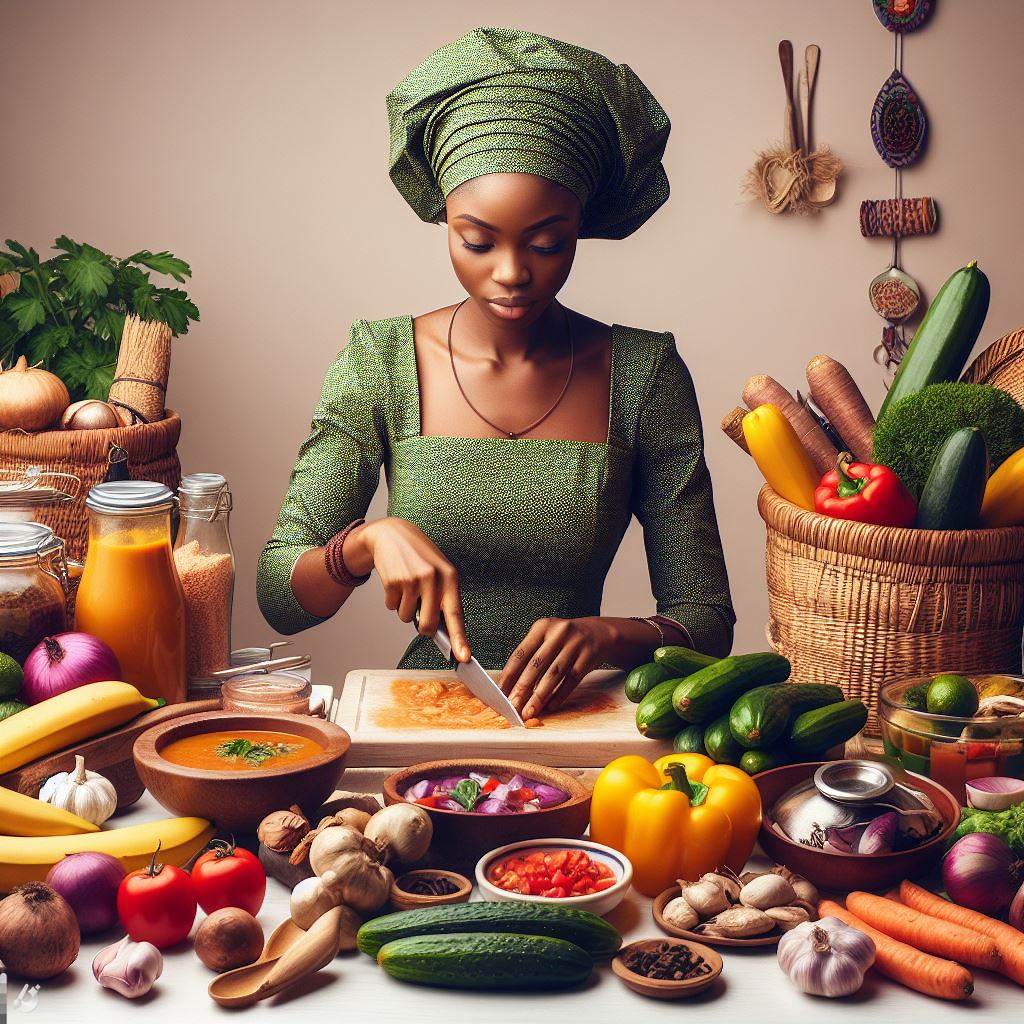Introduction
Nigeria, a country located in West Africa, is known for its rich culture and diverse traditions.
Home economics, on the other hand, plays a vital role in Nigerian society.
When these two aspects are combined, a synergistic relationship is formed, resulting in numerous benefits.
Background information on Nigeria’s culture
Nigeria boasts a diverse culture, with over 250 ethnic groups and various languages spoken.
This cultural diversity is displayed through art, music, dance, clothing, and traditional ceremonies.
Importance of home economics in Nigeria
Home economics is crucial in Nigeria as it equips individuals with skills and knowledge needed for managing their households effectively.
It encompasses various aspects such as cooking, sewing, budgeting, and childcare.
Overview of the synergistic relationship between culture and home economics in Nigeria
The synergy between culture and home economics in Nigeria is evident in many ways.
Traditional recipes and cooking techniques are passed down through generations, preserving cultural identity while promoting good nutrition.
Similarly, traditional clothing designs and textiles reflect Nigerian cultural heritage and are often taught in home economics classes.
Moreover, home economics education emphasizes the importance of traditional family values and roles, reinforcing cultural norms within the household.
This instills a sense of pride and respect for Nigeria’s customs and traditions.
In essence, the synergy between culture and home economics in Nigeria is essential for the preservation and promotion of Nigerian heritage.
It allows individuals to embrace their cultural identity while acquiring practical skills necessary for household management.
By recognizing and valuing this relationship, we can ensure the continued growth and development of Nigerian society.
Read: Challenges & Opportunities in Nigeria’s Tourism Education
Cultural Influences on Home Economics
Traditional Nigerian Cuisine
Nigerian culinary traditions profoundly shape home economics practices, reflecting diverse regional flavors and cooking methods.
Traditional ingredients such as palm oil, yams, and spices define nutritional habits.
Cultural Traditions and Ceremonies
Cultural rituals impact home management, organizing household activities around festivities like weddings or religious ceremonies.
These events dictate arrangements, fostering a sense of community responsibility.
Art, Music, and Folklore
In Nigeria, art, music, and folklore significantly impact clothing choices and interior designs.
Textiles and fashion resonate with vibrant cultural aesthetics, reflecting traditional patterns and preferences.
- Impact on Home Economics Practices: Cooking techniques and indigenous recipes handed down through generations form the cornerstone of home economics education. Emphasizing local cuisines promotes sustainable nutrition.
- Role of Traditional Ingredients and Cooking Techniques: Utilizing native produce like cassava, plantains, and spices not only enriches flavors but also educates on resourceful cooking methods.
- Influence on Home Management and Organization: Cultural ceremonies affect household management, structuring daily routines around communal events. They shape familial roles, teaching valuable skills in coordination and collaboration.
- Role of Gender Roles and Expectations: Cultural norms delineate gender roles impacting household tasks. Home economics education evolves by acknowledging and addressing these societal dynamics.
- Influence on Garments, Textiles, and Fashion Choices: Cultural artistry reflects in clothing, with diverse attires showcasing intricate patterns and designs inspired by folklore and traditions.
- Role of Cultural Aesthetics and Preferences in Interior Design: From vibrant hues to distinct motifs, interior decor mirrors cultural aesthetics, integrating traditional elements into modern home settings.
Understanding the fusion of culture and home economics in Nigeria highlights the significance of preserving heritage while adapting to evolving domestic practices.
Read: Success Stories: Nigerian Home Economics Graduates
Home Economics Contributions to Nigerian Culture
Preserving cultural heritage
In Nigeria, home economics plays a vital role in preserving cultural heritage.
Through the passing down of traditional recipes, home economics ensures that the rich culinary traditions and flavors of Nigerian cuisine are not lost.
These recipes connect generations and serve as a reminder of the country’s diverse cultural heritage.
Furthermore, home economics is essential in maintaining cultural rituals and customs.
It provides the knowledge and skills necessary to uphold traditional practices within Nigerian communities.
Whether it is the preparation of specific meals for religious celebrations or the performance of customary ceremonies, home economics ensures that these rituals are passed down and continue to be a vital part of Nigerian culture.
Enhancing quality of life
Beyond preserving cultural heritage, home economics also enhances the quality of life for Nigerians.
The practices and principles taught in home economics classes have a significant impact on individuals’ health and well-being.
From teaching healthy cooking techniques to emphasizing the importance of nutrition, home economics promotes a balanced and nourishing lifestyle.
Additionally, home economics promotes sustainable living and environmental consciousness.
It educates individuals on the importance of reducing waste, conserving energy, and making environmentally-friendly choices.
These practices contribute to a better quality of life for Nigerians while preserving the natural resources of the country for future generations.
Socioeconomic development
In terms of socioeconomic development, home economics plays a crucial role in Nigeria.
It contributes to entrepreneurship and the growth of small-scale businesses.
By equipping individuals with practical skills in cooking, sewing, and other household management areas, home economics empowers Nigerians to start their own businesses and generate income.
Moreover, home economics is instrumental in poverty alleviation and community development.
Transform Your Career with Expert Guidance
Get personalized mentorship consulting that’s tailored to your unique path. Our expert advice is actionable and exclusive.
Get StartedBy teaching individuals how to budget, make informed financial decisions, and manage their resources effectively, home economics equips Nigerians with the knowledge and skills necessary to lift themselves out of poverty.
Furthermore, by promoting community engagement and collaboration, home economics fosters a sense of unity and shared progress within Nigerian communities.
In fact, home economics is far more than just a subject in Nigerian schools.
Its contributions to Nigerian culture are significant and multifaceted.
From preserving traditional recipes and cultural rituals to enhancing the quality of life and driving socio-economic development, home economics is an integral part of Nigerian society.
By recognizing its value and promoting its practice, Nigerians can continue to benefit from the synergy of culture and home economics.
Read: The Impact of Nigerian Tourism on Global Hospitality Trends

Challenges and Opportunities
The synergy of culture and home economics in Nigeria faces various challenges and opportunities.
This chapter will examine the challenges posed by changing lifestyles and urbanization, the impact of modernization and globalization, and the importance of education and awareness in addressing these issues.
Changing lifestyles and urbanization
The fast-paced development and urbanization in Nigeria have significantly changed the way people live and their daily routines.
Traditional home economics practices, which were once crucial for sustaining households, are now being neglected or replaced by modern conveniences.
The impact on traditional home economics practices is notable.
As people shift towards busier lifestyles, they have less time to engage in activities such as meal preparation, sewing, and budgeting.
The cultural significance of these practices is gradually diminishing.
However, amidst the challenges, there is also potential for innovation and adaptation.
As Nigerians adapt to the changing circumstances, they are finding new ways to incorporate home economics principles into their lives.
For instance, technology is being utilized to create appliances and tools that simplify household tasks.
This presents an opportunity to develop a new generation of home economics practices that align with modern lifestyles.
By embracing innovation and adapting traditional techniques, Nigerians can overcome the challenges posed by changing lifestyles and urbanization.
Modernization and globalization
Modernization and globalization have brought immense changes to Nigeria, including the influence on cultural values and preferences.
With increased exposure to international trends, there has been a shift in consumer behavior, fashion choices, and dietary preferences.
These changes also have implications for home economics.
Traditional Nigerian clothing, cuisines, and household items are being replaced by Western imports.
This raises concerns about the loss of cultural heritage and the need to preserve Nigerian traditions.
However, modernization and globalization also offer possibilities for cultural exchange and diversity in home economics.
As Nigerians interact with different cultures, there is an opportunity to learn and integrate new practices while preserving their own traditions.
By embracing cultural diversity and promoting a sense of pride in Nigerian customs, home economics can become a platform for celebrating both local and global influences.
The fusion of traditional and modern elements can create a unique and vibrant home economics culture in Nigeria.
Education and awareness
One of the key factors in addressing the challenges faced by the synergy of culture and home economics in Nigeria is education and awareness.
Home economics education plays a crucial role in equipping individuals with the skills and knowledge needed to navigate modern challenges.
By promoting home economics education, Nigerians can understand the importance of preserving and adapting their cultural practices.
This fosters an appreciation for the value that home economics brings to individual households and communities.
Moreover, educational initiatives provide opportunities for cultural preservation and development.
Schools and community programs can be platforms for teaching traditional home economics practices, while also encouraging innovation and adaptation.
Through educational initiatives, Nigerians can embrace their cultural heritage, reinforce traditional values, and ensure the continuity of home economics practices for future generations.
In short, the synergy of culture and home economics in Nigeria faces challenges from changing lifestyles and urbanization, modernization and globalization, and the need for education and awareness.
However, these challenges also present opportunities for innovation, cultural exchange, and preservation.
By addressing these issues, Nigeria can build a strong and diverse home economics culture that integrates tradition and modernity.
Read: Modern Trends in Rural Economics: Nigeria’s Standpoint
Conclusion
The culture of Nigeria and the practice of home economics complement each other, contributing to personal and national development.
It is crucial to acknowledge and support the integration of Nigerian culture and home economics in order to maximize their benefits.
Embracing Nigerian culture through home economics can enhance appreciation, preservation, and transmission of cultural heritage.
The synergy between culture and home economics in Nigeria has immense potential for personal growth, community development, and national progress.
Recognizing the value of this synergy and actively promoting it can lead to a stronger society.
By exploring and embracing Nigerian culture through home economics practices, individuals can engage in meaningful traditions and contribute to the preservation of their heritage.
Let us all appreciate and unleash the power of this synergy to create a brighter future for Nigeria and its people.




